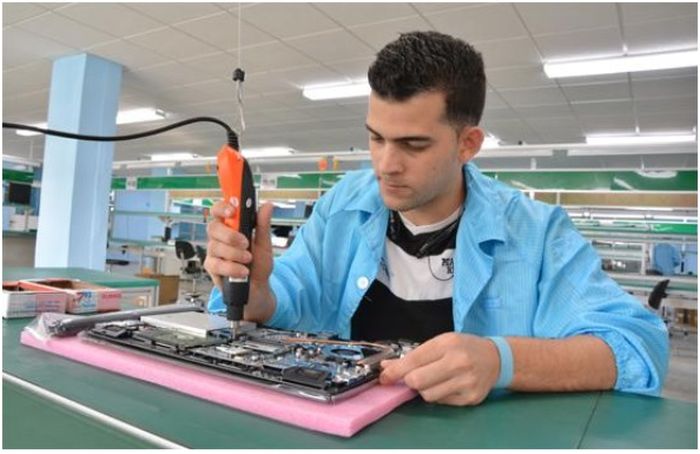The factory can manufacture up to 500 devices a day, with a total annual production capacity of 120,000 units, for which the facility has a staff of 80 workers

If the creation of the first Cuban-made computer (CID-201), was a genuine technological achievement which opened new pathways on the road to the development of information technology in the country during the 1970s, then the inauguration, at the end of last year, of a factory producing portable tablets and computers, is a clear demonstration of the encouraging prospects in this sphere.
The first sixth generation Core i3, Celeron and Core i5 laptops will be ready this month; as well as eight and ten inch tablets, which will initially be destined for the wholesale market in order to supply state institutions and organizations affiliated with Central State Administration, representing a step forward in efforts to continue expanding the computerization of Cuban society, in accordance with the country’s financial possibilities.
René Cano Díaz, director general of the Informatics, Communications and Electronics Industrial Enterprise (Gedeme), leading the project, explained that the whole process was completed in less than four months, including the installation of the production line and training personnel responsible for assembling the devices.
He added that the new project is a collaborative initiative with the Chinese company Haier, which is providing technology, equipment, know-how, quality control laboratories and staff training, as well as the raw materials for production.
Also collaborating on the project is Cuba’s University of Computer Sciences, which is supplying the Nova and NovaDroid operating systems and computer applications for the new equipment, stated Cano Díaz, who noted that the country purchased over 48,000 units of parts and pieces to manufacture the first batch of laptops and tablets.
500 DEVICES A DAY
Engineer Julio A. Rodríguez Fuertes, director of Servimática, one of Gedeme’s seven basic enterprise units, and responsible for producing the new technologies, explained that the factory can manufacture up to 500 devices a day, with a total annual production capacity of 120,000 units, for which the facility has a staff of 80 workers. The factory, founded 20 years ago, was also home to the country’s first computer production line.
Speaking about the benefits of the 10 inch tablets, the director highlighted that they come with a range of accessories, such as a keyboard, which almost functions like a mini-laptop, as well as HDMI, USB and mini USB ports, while the device is also able to process up to 1TB of external information.
Regarding staff preparation, project leader Fernando Fernández Fernández, noted that training has been conducted over various stages. First Gedeme’s head specialists underwent a month-long training course at the Chinese company’s facilities. Later, technicians across every stage of the production process were trained in Cuba.
The National Software Enterprise (Desoft) conducted a rigorous selection process to choose technicians, in order to guarantee quality devices and a sustainable work routine, explained Fernández; who added that the facility has become a source of employment, above all for young people.
He noted that the majority of the devices will be distributed by Copextel, affiliated with the Ministry of Communications, adding that Haier will provide replacement parts – also distributed by Copextel – under the terms of the three-year agreement established between Cuba and its Chinese partner.
ALL ABOUT QUALITY
Quality control measures are undertaken from the moment the equipment arrives, throughout the entire manufacturing process, including 27 operating tests, stated Yolanda Domínguez Llanes, quality control head specialist. The devices that come off the line undergo various tests to verify their functioning, she noted.
According to Domínguez Llanes, such measures help to ensure that the devices function correctly, for which the factory also has a laboratory to certify the durability of components, and test the useful life of the laptop hinges; USB ports; external control buttons; touch screens; temperature; humidity and salinity-resistance.
Cano Díaz noted that he believes the project will contribute to the country’s technological sovereignty and sustainability, and as Fidel predicted, help Cuba gain access to more knowledge and participate in the process of the globalization of information, characterized by the social inclusion and the sharing of knowledge.
NEW PROJECTS
Gedeme is also undertaking new projects such as the construction and installation of Smart Classrooms (technology enhanced classrooms that foster opportunities for teaching and learning by integrating learning technology, such as computers, specialized software, assistive listening devices, networking, and audio/visual capabilities) across the county, in order to support the teaching-learning process. The first prototype classroom was unveiled during the most recent edition of the country’s International Industry Fair (Cubaindustria-2016), where it stood out for its excellent results.
The first four facilities of this kind are destined for the University of Medical Sciences of Havana; Enterprise Management, Technical and Administrative Improvement Center; the José Antonio Echeverría Technological University in the capital; and the Comprehensive Automation Enterprise, with a plan to install 50 classrooms this year.
Like the new computer factory, this initiative is also benefiting from the support of Chinese company Haier and the UCI. The smart classrooms will broaden student-teacher interaction through the use of computer-based solutions available across the education network and provide access to virtual platforms in real-time. They will be equipped with tablets, servers, interactive touch screen whiteboards with wifi and a short-throw projector, creating a safe and energy efficient environment.
Another of the Gedeme’s projects is related to cell and landline phones, for which studies into potential partners are underway; as well as another for the continued production of LED lights with a useful life of up to 10 years, and assembly of desktop computers; 54,698 of which – either Core i3, i5, or i7 and all sixth generation – as well as more than 8,000 light computers also known as “thin clients” (with no hard drive) were produced last year and marketed by Copextel.
 Escambray ENGLISH EDITION
Escambray ENGLISH EDITION





Escambray reserves the right to publish comments.